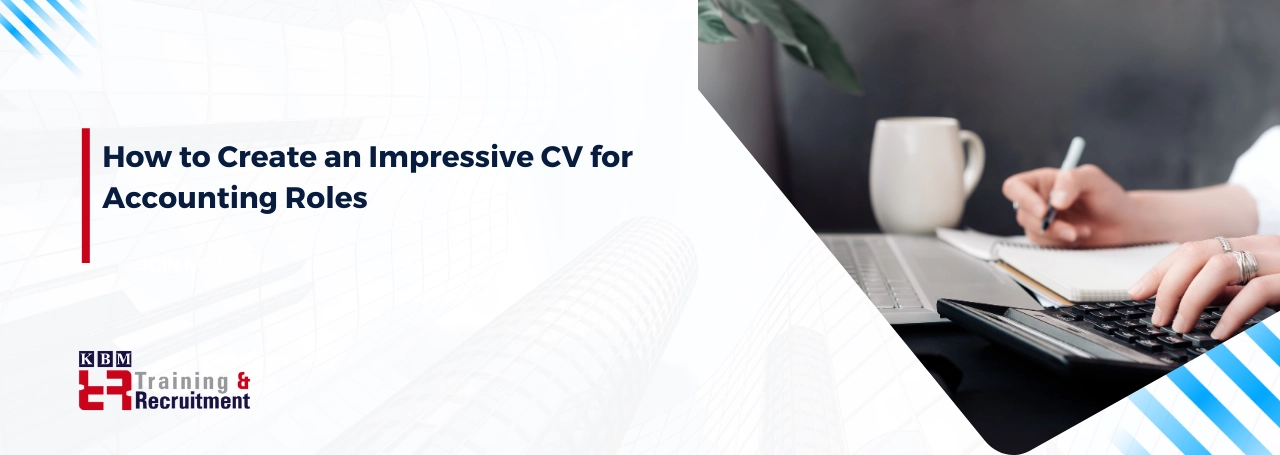Having a good CV can lead to fascinating career opportunities in accounting. You could be fresh out of school or an older, wiser professional. Your CV should reflect your skills, experience, and accomplishments. Interviewers tend to spend no more than a few seconds reviewing each CV, so yours should stand out immediately.
This article will guide you in preparing an impressive CV tailored for accounting roles. Follow these practical steps to help your CV stand out and land more interviews.
Start with a clear structure
Your CV should be well-organised and easy to read. Use a clean layout with clear headings and simple fonts. Keep your CV to two pages. This length is ideal for showing your experience without overwhelming the reader.
Begin with your name and contact details at the top. Include your email address, phone number, and LinkedIn profile if you have one. Make sure all details are up to date and professional.
Write a strong personal statement
Your personal statement goes just below your contact details. This short paragraph should summarise who you are, what you do, and what you aim to achieve. Make it relevant to the accounting role you want.
For example, you might say you are a part-qualified accountant with strong attention to detail and experience in preparing financial statements. Focus on what makes you valuable and what you can bring to the company.
Highlight your key skills
List your core skills near the top of your CV. These should reflect what employers in accounting look for. Use simple terms and avoid jargon. Include skills such as financial reporting, budgeting, tax preparation, or the use of accounting software like Sage, Xero, or QuickBooks.
If you are applying for a specific role, read the job description carefully. Then, match your skills to what the employer is asking for. This shows that you understand the job and are well suited for it.
Show your work experience
Your work experience is one of the most important parts of your CV. List your jobs in reverse order, starting with the most recent. Include your job title, the company name, the dates you worked there, and a short description of your duties.
Focus on achievements and results. For example, say how you improved a reporting system, reduced errors, or supported a busy audit process. Use action words like managed, prepared, analysed, or improved to describe your work.
Even if you have little experience, include internships or volunteer work. These can also show your commitment to the profession.
Include your education and qualifications
List your qualifications after your work experience. Start with your most recent qualification. Include your degree, the university or college name, and the year you finished. If you studied accounting or finance, mention any key modules like taxation or financial accounting.
If you have professional qualifications, such as AAT, ACCA, or CIMA, make sure you highlight them. Mention your current status if you are part-qualified or working towards completion.
Add relevant software knowledge
Accounting roles often require knowledge of specific software. Mention any software you have used in your training or work. Employers value candidates who can use digital tools effectively.
List systems such as Sage 50, Xero, QuickBooks, Excel, or payroll software. If you have any certifications in these tools, include them. Being confident with software can give you an advantage over other candidates.
Include other useful information
You can add a short section for languages, volunteering, or achievements. These can help show that you are a well-rounded candidate. For example, if you volunteered to help with a charity's accounts, this shows both your skills and your values.
If you recently completed any short courses or workshops, include them. Continuous learning shows your drive and willingness to improve.
Check and update regularly
Before sending your CV, check it carefully. Look for spelling mistakes and grammar errors. Ask someone else to read it if possible. A small mistake could make you look careless.
Make sure your CV is tailored for each role. Read the job advert and update your CV to reflect what the employer wants. Avoid sending the same CV to every job. A customised CV has a better chance of success.
Final thoughts
Building a great CV for accounting jobs is all about demonstrating your abilities and experience clearly and confidently. Keep your format simple, your tone robust, and your intent focused. Emphasise what you can deliver, support with genuine examples, and customise every application.






















